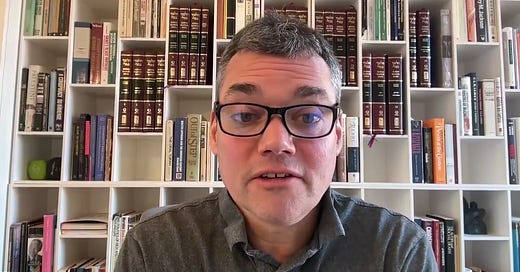Our Zoom call this week will be at the usual time: Friday at Noon EST.
Our guest will Ussama Makdisi, Professor of History and Chancellor’s Chair at the University of California Berkeley, author most recently of Age of Coexistence: The Ecumenical Frame and the Making of the Modern Arab World and co-host of the Makdisi Street Podcast. I want to ask Ussama, who is one of America’s leading historians of the Middle East and of the long encounter between Palestinians and Zionism, what makes this current moment distinct. I also want to ask how his scholarship into the history of coexistence between Muslims, Christians, and Jews in the Arab world can help us think about a future of coexistence and equality in Israel-Palestine and across the Middle East.
Paid subscribers will get the link this Tuesday and the video the following week. They’ll also gain access to our library of past Zoom interviews with guests like Rashid Khalidi, Thomas Friedman, Ilhan Omar, Benny Morris, Noam Chomsky, and Bret Stephens.
Sources Cited in this Video
Bill Clinton’s comments after first meeting Benjamin Netanyahu in the White House are recorded in books by both Aaron Miller and Dennis Ross.
When Netanyahu said “America is something that can be moved easily.”
The problem with dropping humanitarian aid from the air.
Why America’s military support for Israel’s war likely violates US law.
Things to Read
(Maybe this should be obvious, but I link to articles and videos I find provocative and significant, not necessarily ones I entirely agree with.)
In Jewish Currents (subscribe!), Dahlia Krutkovich and Jonathan Shamir write about the fight over Gaza inside Britain’s Labour Party.
Khalil Sayegh, a former guest on one of my Friday Zoom interviews and someone from whom I’ve learned a great deal, has launched a Go Fund Me page to evacuate his family from Gaza. It’s horrifying that so many people need to do this. I hope you’ll take a moment to imagine how you’d feel if your family were in such desperate straits and consider supporting him.
“I love Israel, but not more than Judaism itself. Not more than humanity.” Rabbi Kate Mizrahi on why she supports a ceasefire.
Jon Stewart on how US officials talk about war crimes in Ukraine versus Israel.
I spoke with Rania Batrice about anti-war mobilization inside the Democratic Party for the Foundation for Middle East Peace.
I spoke with Ali Velshi on MSNBC about the political problems the war in Gaza is creating for Joe Biden.
I’ll be speaking virtually at Southern Connecticut State University on March 4 and in person on March 6 at the University of Texas at Austin, March 11 at the City University of New York, March 27 at Quinnipiac College, and March 28 at Hofstra University.
I sometimes get emails that strike me as deserving a wider audience. The following is from a professor at a prestigious liberal arts college. Although I’ve been highly critical of the way charges of antisemitism are wielded to suppress pro-Palestinian speech, this email—which I’ve edited for concision and clarity—captures something that worries me about the Israel-Palestine debate on at least some campuses.
“I have had two students recently ask me for letters of recommendation to transfer to other colleges on account of anti-Semitism…in asking one of the two students who wants to transfer what happened, it became clear that his fellow students had blocked him from phone chats and systematically blanked him in face-to-face interactions after he first expressed support for Israel's right to exist and then showed up on campus in a yarmulke after Temple, which was taken as a political declaration. It seems to me that there is a form of anti-Semitism that consists in treating Zionism per se (as opposed to support for Netanyahu or the settlers or whatever) as morally equivalent to Nazism, rather than being on a par with other mistaken ideologies like Hindutva - retrograde but not the kind of thing that ought to put one beyond the pale.”
See you on Friday at Noon,
Peter
VIDEO TRANSCRIPT:
There’s a famous story about the first time that Benjamin Netanyahu met Bill Clinton after Netanyahu had been elected in 1996. And Netanyahu started lecturing Clinton about the Middle East and about Israel Palestine, and then Netanyahu left the room. And, according to Aaron Miller’s book, Bill Clinton turns to his advisors and said, ‘who the fuck does he think he is? Who’s the fucking superpower here?’ A similar version of this story shows up in Dennis Ross’s book.
I’ve been thinking about this line of Bill Clinton’s—who’s the fucking superpower here—because the United States is now in a truly bizarre situation in which Israel is prosecuting a war that is starving the people of Gaza to death. They’re starving because very few trucks are getting through to provide the aid they need to live and the medicines they need to live. Now, this aid is not getting through because Israel has a very, very laborious inspection process that really reduces the number of trucks that can get through. Also, because Israel is still bombing in places, which makes it hard for the trucks to travel safely with that aid. And because, in the north of Gaza where Israel has largely decapitated Hamas, there is total lawlessness, so it’s not safe to deliver trucks. The trucks are getting stormed by starving people. We saw this tragically last week in this massacre that killed roughly a hundred people.
And these policies are being carried out with America’s deep participation, right? America is supplying Israel the weaponry that it is using to prosecute this war. And America is protecting Israel at the United Nations and other international forums from the consequences of its policies, right? So, the US is deeply involved in these policies that are starving the people of Gaza to death. And you might think that because the Biden administration is now publicly saying it’s very, very concerned about this famine that’s taking place, that it would say, ‘we will no longer participate in these policies that are people starving people in Gaza to death.’ But that’s not what the Biden administration is saying. The Biden administration is essentially saying, ‘well, we can’t do much about that. But here’s this brilliant workaround. We’ll drop the aid from the air,’ right?
It’s actually not such a brilliant workaround because, according to humanitarian experts, it’s very, very expensive and inefficient to deliver aid from the air. The aid can land very far away from where you want it to land. So, let’s say you have possible supplies. They may not land near the hospital. Also, there’ve been suggestions that some of this aid may land in the sea, and it may be dangerous for people in Gaza to retrieve it. The obvious answer is to start the delivery of aid by land. And yet the Biden administration still is kind of essentially shrugging its shoulders or saying, ‘pretty please, we’d really like you to let more of this aid in,’ as if the United States doesn’t have any leverage here, right? It is with US weapons that Israel is prosecuting this war.
And indeed, the US is probably violating its own law by participating in this starvation of Gaza because under the Foreign Assistance Act, it’s illegal for the US to provide arms to countries that are committing grave human rights violations. And remember the International Court of Justice has said that this could plausibly be a genocide. And it’s also under the Foreign Assistance Act illegal for the US to provide arms to countries that are impeding the delivery of US humanitarian assistance, which Israel is also doing, right?
So, rather than complying with US law, and saying that America will not be complicit in these policies, the Biden administration shrugs its shoulders and says, ‘well, we’ve got a creative workaround. Since we can’t do anything about that, let’s drop things from the air.’And you know, it’s funny, there’s a whole group of people in Washington who are really obsessed with this idea of credibility, right? Like America needs to look strong, right? So, when Obama said that the use of chemical weapons in Syria was a red line, but then he didn’t go to war, America lost credibility. When we pulled out of Afghanistan, we lost credibility. This was the argument made for Vietnam. Our credibility is on the line in Vietnam. You notice these credibility arguments almost always made to start wars or continue wars, right? But this seems to me a very obvious case in which America’s refusal to take actions to end the war actually seriously undermines our credibility. Because it’s not just like the world is looking at this and saying, this is profoundly immoral that all these people are starving to death. But it also makes America look totally impotent, right, when America won’t use the tools that are at our disposal to stop the war.
It seems to me that Biden could say to Netanyahu, ‘listen, you will not use any more American weaponry in this war. And we will not shield you from the consequences in international legal forum of this war because we believe in international law. We want to hold Hamas account accountable for its war crimes. And we want to hold Vladimir Putin accountable for his war crimes. And we can’t credibly do that unless you also go through a process in which these things are adjudicated at places like the International Criminal Court and the International Court of Justice.’
‘And by the way,’ the US can say, ‘we also care very passionately about the hostages. And we know the only way to save the lives of these remaining hostages is by ending the war in a ceasefire because those hostages are also people in Gaza. So, if you’re starving Gaza and you’re bombing Gaza, you’re impairing the lives of the people in Gaza. And the only way to save their lives is by ending the war and having a ceasefire.’
And this, I think, would be the moral step for the US to take. And I think it would be in America’s self-interest, but it would also just be an act of self-respect by the Biden administration. This Biden administration, which for weeks and months now, has been basically tiptoeing around telling reporters they’re unhappy and saying, ‘pretty please we really hope that Netanyahu’—this is not how Benjamin Netanyahu works! Really? Are these people still so naive about this guy after all of those years since that meeting with Bill Clinton? This guy who in 2001 was caught on tape saying to Israeli settlers, ‘America is something that can be moved easily.’ That’s how Netanyahu thinks about American presidents. And you know what? The Biden administration is proving him right. As a matter of self-respect, if nothing else, the United States needs to say that it will not continue to be complicit in a war that it believes is morally wrong, and that it believes will undermine—not improve—the safety and security of Israelis. And this dropping of humanitarian aid from the air is a way of refusing to confront that fundamental need to assert America’ self respect.










